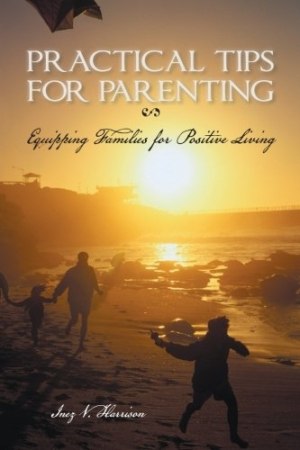Practical Tips for Parenting
Equipping Families for Positive Living
Heartwarming tips on how to express parental love encourage building constructive parenting skills.
As if being one of fourteen children wasn’t enough of a lesson in familial relations, author Inez V. Harrison has also dealt with troubled parents and children in a county juvenile delinquency court. In Practical Tips for Parenting: Equipping Families for Positive Living, she shares what she learned from that experience in the hopes of arming mothers and fathers with constructive parenting techniques that will be passed down to future generations.
Over sixteen very short chapters, Harrison offers balanced, real-world advice to foster better relationships between children and their parents. Harrison begins each chapter with a quote from an author or motivational speaker such as Tony Robbins, and she ends each with an easily scanned bulleted list of tips. She also often references verses from the Bible, so much so that the book’s title should indicate the religious nature of Harrison’s advice.
Promoting love in the first chapter, she encourages parents to use pet names for their kids, participate in their interests, and leave surprise love notes around the house. Other chapters in Practical Tips for Parenting focus on effective communication by instructing parents to decide what rules are nonnegotiable and to stick to them.
In one particularly effective passage, Harrison describes a tense morning between a mother and her teenage daughter. When the teen attempts to go to school in a too-revealing shirt, the author doesn’t want the mother to simply order her daughter to change. Instead, Harrison suggests that the mom say, “I don’t believe you want to draw attention to who you are on the outside rather than who you are inside. What I would like is for you to wear an outfit that reflects that person.” By providing example dialogue, Harrison shows how parents can pair “don’t statements” with “dos,” as well as how to offer thoughtful rationales for their concerns.
The mother and daughter scene stands out because it is one of the few times Harrison uses an example to illustrate her parenting tips. With thirteen brothers and sisters, her own children, her time as a high school teacher, and the eighteen families she counseled through the Nurturing Generation to Generation program she piloted, Harrison has more than enough real-world experience and case studies to cite, and names could be changed to protect identities.
Such examples could have elevated Practical Tips for Parenting to a true reference guidebook for parents because Harrison’s tips are eloquently phrased and undoubtedly useful. Yet, in its brevity, the text effectively distills parenting to what’s most important. In her stories of mothering her own kids, Harrison explains that she concentrated on “building character in them, on praising and encouraging them, on discerning and listening to their feelings, on solving problems, and on creating an environment of trust, care, and respect.” Again and again, Harris returns to the same simple theme: “Our demonstrated love is our children’s destiny.”
Reviewed by
Amanda McCorquodale
Disclosure: This article is not an endorsement, but a review. The publisher of this book provided free copies of the book and paid a small fee to have their book reviewed by a professional reviewer. Foreword Reviews and Clarion Reviews make no guarantee that the publisher will receive a positive review. Foreword Magazine, Inc. is disclosing this in accordance with the Federal Trade Commission’s 16 CFR, Part 255.

